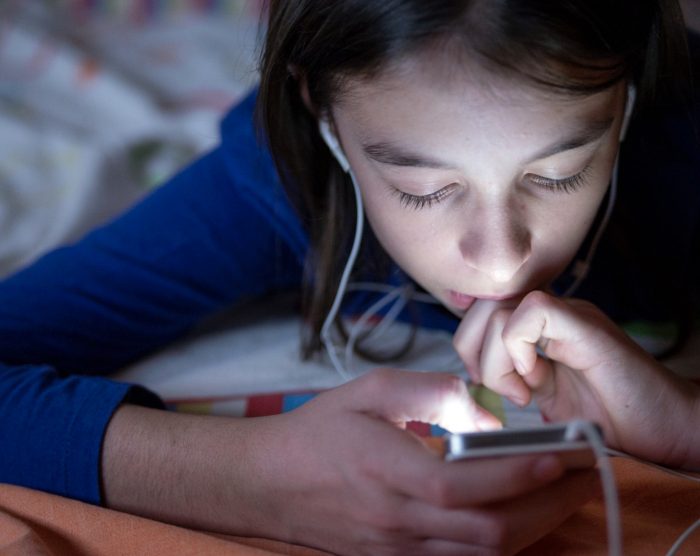Every day my 15-year-old sits on her bed and watches Netflix on her laptop and Tik Tok on her iPhone.
My 17-year-old lies on a mattress in the basement and watches a series on HBO or Showtime and scrolls Instagram, Snapchat, Tik Tok, or YouTube on her iPhone. They leave the bed and the mattress only to eat and shower.
This is our new normal.
A phrase I despise, yet best describes what’s happening at our home that wasn’t pre-pandemic—and I’m not sure how I let it happen.
A year ago, my girls filled the hours of their day with school, homework, sports, jobs, and hanging out with their friends. It didn’t leave much time to be on a screen. I mean, they fit it in—they scrolled in the morning while they ate, on the car ride to school, and after dinner. Our rule was no phones during dinner or right before bed.
I made a habit of reminding them that social media was bad for their emotional health. They’d smile with closed lips—their way of telling me to go away.
Then the pandemic hit.
They had a few hours of school a day but not the six hours they normally had. They didn’t have homework, sports, or friends to hang out with, so they filled the hours of the day binge-watching series and checking their feeds.
They downloaded Comcast and Netflix onto their phones and then disappeared. I checked on them several times a day. They never moved. I turned a blind eye to the excessive screen time and told myself it was pandemic behavior. It would change when the pandemic was over—soon.
Nothing was normal the first few months; I let previously enforced rules slide because we’d be back to normal life soon.
Dinners were eaten in front of the television. My younger daughter binged while she ate every meal on the couch. My older daughter watched hours of YouTube influencers in bed until the early hours of the morning. There was no schedule or routine. They watched whatever they wanted, whenever they wanted.
When they were little, I was crazy about what they watched and how much time they spent in front of the television. I didn’t want their little brains filled with commercials, so they watched PBS and fell in love with “Arthur and Word Girl.” After watching commercials on Nickelodeon Jr. at my parents’ house, they needed detox. The car ride home was a long list of what toys they wanted me to buy them.
I held off on getting them phones until seventh grade, when everyone else had one. My rule was no social media, only texting. I made it clear that the phone was mine, not theirs. They’d lose it if they broke the rule.
Once they got a phone, they were hungry for social media. It came up in conversation daily. I envisioned their heads filled with unrealistic images that would dictate their self-worth. I refused to let my years of raising strong, independent, confident girls be destroyed in a few months, heck, a few weeks. It was harder to be the mom who said no rather than yes I told them—they disagreed.
But one night during my older daughter’s freshman year of high school, she sobbed before bed. “I don’t get invited to do things,” she said. Her friends made plans and had inside jokes on an app, and she wasn’t a part of it. My heart sank. I caved and allowed her to be on one app—only one. Her eyes widened, and she hugged me tightly. It should have felt good, but it didn’t.
But my girls self-regulated their phone time well. They maintained high grades and good sleep habits. They didn’t take their phones to bed. They didn’t stare at it while talking to others. Their routines and priorities were commendable. In part, because they’re really good kids. And in part, because I helped them make good decisions. Part of my mother’s job description.
I didn’t want them addicted to their phones or anything else. I prepared them for parties and sitting in car parking lots with friends when they’d be offered booze and pot and felt tempted to join their friends. I was honest about alcohol, pills, Jules, and cigarettes. “Be prepared,” I said, “If you try it, you might love it.” They rolled their eyes. “You’re so dramatic,” one of them said—but they knew I was right.
A few months into the pandemic, my negligent parenting got to me.
I didn’t recognize myself and couldn’t watch them rot any longer. I made them get off their screens for an hour a day. “What do you want us to do?” my 15-year-old asked. Her question spoke volumes. “Take the dogs for a walk, read a book, clean your room, draw,” I said.
At first, it was amazing. One of them read an entire book in two days and went beyond her one-hour minimum. The other one got up early to run. They organized their closet together while listening to Taylor Swift. They talked, laughed, and fought. Sounds I hadn’t heard from since they were little and free from the lure of a phone.
But after a few weeks, their willingness to sacrifice an hour waned. They wanted to split up the hour—or they wanted to take the dogs for a 20-minute walk and call it time served. They were preoccupied and eager to get back to their nooks to watch shows and scroll. I sensed a feeling of urgency as though nothing was more important than watching and binging.
“Everyone’s on their phone all day,” my 15-year-old reassured me when I expressed concern. “If everyone jumped off a bridge, would you jump off a bridge?” My father used to ask me in the 90s.
I hated that response. Yet, it’s still true. I don’t care what other teenagers are doing. I care that my girls’ minds are being altered by advertising, questionable content, and an unhealthy number of hours in front of a screen. And there’s no real way to tell how it will affect them later.
Where’s my young-mother-self who parented with pride and resisted the easy way out? The one who didn’t allow “Sponge Bob” in her house? The one with a plan to raise free thinkers at all cost? I can hear her shouting, “Do something!”
But I’d tell her this: there are a lot of hours to fill in a teenager’s day right now. Ones that were once filled with in-person school, sports, jobs, celebrations, proms, visits to college campuses, Spirit Week, dinners with friends, and sleepovers, and now these hours are spent at home.
They’re numbing their grief with distraction on their screens.
I want to believe that when life returns, slowly, so too will my girls and their ability to self-regulate their screen time. It’s what I tell myself, so I can sleep at night—while the two of them are watching four screens.
~









Read 4 comments and reply